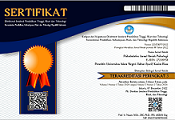Parent-Child Emotion Talk (PCET) Dynamics in The Trajectory of Children's Emotion Understanding Development : A Systematic Review
Abstract
Kemampuan emotion understanding (EU) yang dimiliki anak dapat berpengaruh terhadap interaksi sosial, kesejahteraan psikologis, adaptasi anak terhadap lingkungan sekitarnya, hingga dapat mencerminkan bagaimana kecerdasan emosional yang mereka miliki. Berdasarkan literatur sebelumnya, peran orang tua sangat penting dalam menstimulasi perkembangan EU anak mulai dari masa kanak kanak awal hingga menengah, salah satunya melalui parent-child emotional talk (PCET). Namun, dinamika yang terjadi antara PCET dengan peningkatan kemampuan EU dalam perkembangan anak, khususnya dalam beberapa tahun terakhir, masih belum jelas. Dari 54 studi terkini yang ditemukan melalui pencarian database menggunakan metode PRISMA, peneliti mengumpulkan 9 artikel yang kemudian ditinjau secara sistematis pada penelitian ini. Hasil tinjauan sistematis menunjukkan bahwa (1) PCET berdampak signikan pada perkembangan EU anak pada usia prasekolah (3-6 tahun), sementara pada usia balita (1-3 tahun) dan kanak-kanak menengah (6-11 tahun) pengaruhnya lebih terbatas; (2) PCET yang melibatkan pelabelan emosi, validasi emosi anak, serta interaksi kausal yang aktif, terbukti paling efektif dalam meningkatkan EU anak. Tinjauan ini menggarisbawahi pentingnya memahami periode usia anak yang tepat dalam pemberian PCET serta karakteristik percakapan yang sesuai, agar dapat secara efektif memengaruhi perkembangan EU anak.
Keywords
Full Text:
PDFReferences
Berk, L. E. (2013). Development Through the Lifespan (6th ed). USA: Pearson Education.
Bjørk, R. F., Bølstad, E., Pons, F., & Havighurst, S. S. (2022). Testing TIK (Tuning in to Kids) with TEC (Test of Emotion Comprehension): Does enhanced emotion socialization improve child emotion understanding?. Journal of Applied Developmental Psychology, 78, 101368.
Camras, L. A. (2022). Emotional development across the lifespan. The Guilford Press.
Cao, Y., Wang, H., Lv, Y., & Xie, D. (2023). The influence of children’s emotional comprehension on peer conflict resolution strategies. Frontiers in Psychology, 14, 1142373.
Chan, M., Williams, A. I., Teng, Y. P. T., & Zhou, Q. (2023). Links between parent-child emotion talk and preschoolers’ socioemotional behaviors in Chinese-heritage families. Early Education and Development, 34(2), 366-386.
Cooper, A. M., Reschke, P. J., Porter, C. L., Coyne, S. M., Stockdale, L. A., Graver, H., ... & Walle, E. A. (2023). “Oh no! What happened?” an investigation of parent–child conversations about self-conscious emotions. Developmental Psychology.
Doan, S. N., Lee, H. Y., & Wang, Q. (2019). Maternal mental state language is associated with trajectories of Chinese immigrant children’s emotion situation knowledge. International Journal of Behavioral Development, 43(1), 43-52.
Eisenberg, N., Cumberland, A., & Spinrad, T. L. (1998). Parental socialization of emotion. Psychological inquiry, 9(4), 241-273.
Flykt, M. S., Lindblom, J., Belt, R., & Punamäki, R.-L. (2021). The role of mother's prenatal substance use disorder and early parenting on child social cognition at school-age. Infant and Child Development. e2221. https://doi.org/10.1002/icd.2221
Forslund, T., Peltola, M. J., & Brocki, K. C. (2020). Disorganized attachment representations, externalizing behavior problems, and socioemotional competences in early school-age. Attachment and Human Development, 22, 448–473. https://doi.org/10.1080/14616734.2019.1664603
Kitchenham, B. (2004). Procedures for performing systematic reviews. Keele, UK, Keele Univ, 33
Lambie, J. A., Lambie, H. J., & Sadek, S. (2020). “My child will actually say ‘I am upset’… Before all they would do was scream”: Teaching parents emotion validation in a social care setting. Child: Care, Health and Development, 46(5), 627-636.
Leyva, D., Catalan Molina, D., Suárez, C., Tamis-LeMonda, C. S., & Yoshikawa, H. (2021). Mother-child reminiscing and first-graders’ emotion competence in a low-income and ethnically diverse sample. Journal of Cognition and Development, 22(4), 501-522.
Ogren, M., & Johnson, S. P. (2021). Factors facilitating early emotion understanding development: Contributions to individual differences. Human development, 64(3), 108-118.
Pate, A., Salmon, K., Fortune, C. A., & O’Kearney, R. (2020). Maternal elaborative language in shared emotion talk with ODD children: Relationship to child emotion competencies. Child Psychiatry & Human Development, 51(2), 254-267.
Pons, F., Harris, P. L., & De Rosnay, M. (2004). Emotion comprehension between 3 and 11 years: Developmental periods and hierarchical organization. European journal of developmental psychology, 1(2), 127-152.
Pozzoli, T., Gini, G., & Altoè, G. (2017). Associations between facial emotion recognition and young adolescents’ behaviors in bullying. PLoS One, 12, e0188062. https://doi.org/10.1371/journal.pone.0188062
Reschke, P. J., Clifford, B. N., Brown, M., Siufanua, M., Graver, H., Cooper, A. M., Porter, C. L., Stockdale, L. A., Coyne, S. M. (2024). Links between parent-child conversations about emotions and changes in children's emotion knowledge across early childhood. Child Dev, 95(1):82-97. https://doi.org/10.1111/cdev.13960
Ruba, A. L., Kalia, V., & Wilbourn, M. P. (2022). Happy, sad, or yucky? Parental emotion talk with infants in a book‐sharing task. Infancy, 27(2), 277-290.
Spunt, R. P., & Adolphs, R. (2019). The neuroscience of understanding the emotions of others. Neuroscience letters, 693, 44-48.
Viana, K. M., Zambrana, I. M., Karevold, E. B., & Pons, F. (2020). Emotions in motion: impact of emotion understanding on children’s peer action coordination. Cognition and Emotion, 34(4), 831-838.
Voltmer, K., & von Salisch, M. (2017). Three meta-analyses of children's emotion knowledge and their school success. Learning and Individual Differences, 59, 107-118.
Vygotsky, L. S. (1978). Mind in society: The development of higher psychological processes. Cambridge, MA: Harvard University Press.
Wang, M. (2017). Family Expressiveness and Children’s Emotion Understanding (Doctoral dissertation, Thèse de doctorat indite]. The Ohio State University, Columbus, OH, États-Unis).
Yuill N, Little S. Thinking or feeling? An exploratory study of maternal scaffolding, child mental state talk, and emotion understanding in language-impaired and typically developing school-aged children. Br J Educ Psychol. 2018 Jun;88(2):261-283. https://doi.org/10.1111/bjep.12194
Zhang, H. (2018). Relations of Parent-Child Interaction to Chinese
Zheng, J. (2023). Analyzing the Developmental Processes and Influencing Factors of Children’s Emotional Recognition, Expression, and Regulation Abilities: A Comprehensive Review. Studies in Psychological Science, 1(2), 1-16.
DOI: http://dx.doi.org/10.24014/pib.v6i3.36189
Refbacks
- There are currently no refbacks.
Redaksi Psikobuletin: Buletin Ilmiah Psikologi
Publisher: Universitas Islam Negeri Sultan Syarif Kasim Riau
Jl. H.R. Soebrantas Km. 15.5 No. 155 Gedung Fakultas Psikologi UIN Sultan Syarif Kasim Riau Kel. Tuahmadani Kec. Tampan Pekanbaru - Riau 28293.
E-mail : psikobuletin@uin-suska.ac.id / Website :http://ejournal.uin-suska.ac.id/index.php/Psikobuletin
Psikobuletin : Buletin Ilmiah Psikologi by Fakultas Psikologi is licensed under a Creative Commons Attribution 4.0 International License.



31.png)





